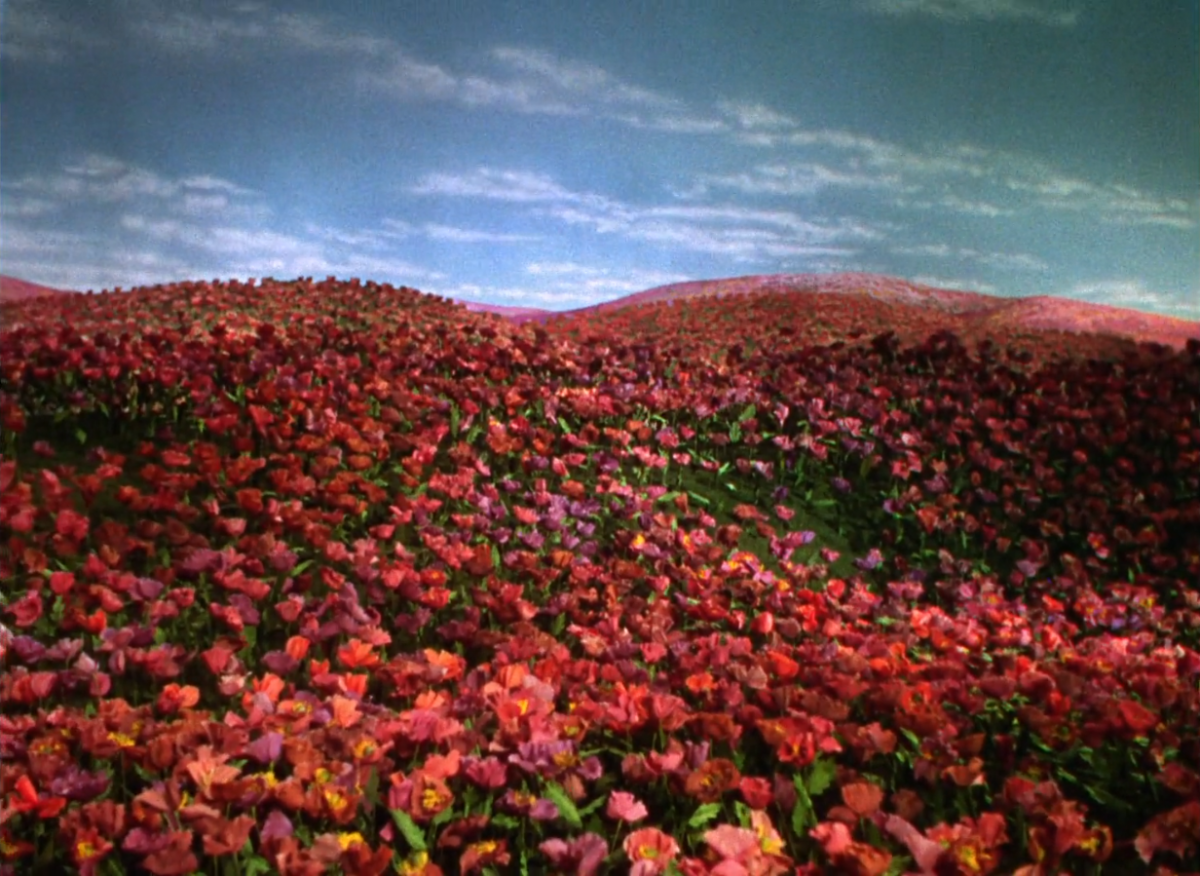
Dorothy Gale and her dog Toto are swept up by a tornado from her home in Kansas. Together they suddenly find themselves in the world of Oz, having to find their way back home, with a little help from some new friends.
EN
Where troubles melt like lemon drops
Away above the chimney tops
That’s where you'll find me
Somewhere, over the rainbow
“I thought it was real.”
Derek Jarman
“Ever since The Wizard of Oz I’ve been accused of being twelve years old. You should see some of the disappointed looks I get, when people lay eyes on me in person. They expect someone in gingham, with braids, to come out singing ‘Over the Rainbow’. And out I come, instead. I think some of them are pretty angry with me, too, for not wearing braids, and not dressing like Dorothy, and not being eleven or twelve. They’ve written in about it.”
Judy Garland
“If The Wizard of Oz began in one way and continued in another, that was also the history of the production. Richard Thorpe, the original director, was fired after 12 days. George Cukor filled in for three days, long enough to tell Judy Garland to lose the wig and the makeup, and then Victor Fleming took over. When Fleming went to Gone With the Wind (1939), King Vidor did some of the Munchkin sequences, and the Kansas scenes. There were cast changes, too; after Buddy Ebsen, as the Tin Man, had an allergic reaction to the silvery makeup, he was replaced by Jack Haley. Musical numbers were recorded and never used. Margaret Hamilton (the Wicked Witch of the West) was seriously burned when she went up in a puff of smoke. Even Toto was out of commission for two weeks after being stepped on by a crewmember.
We study all of these details, I think, because The Wizard of Oz fills such a large space in our imagination. It somehow seems real and important in a way most movies don't. Is that because we see it first when we’re young? Or simply because it is a wonderful movie? Or because it sounds some buried universal note, some archetype or deeply felt myth? I lean toward the third possibility, that the elements in The Wizard of Oz powerfully fill a void that exists inside many children. For kids of a certain age, home is everything, the center of the world. But over the rainbow, dimly guessed at, is the wide earth, fascinating and terrifying. There is a deep fundamental fear that events might conspire to transport the child from the safety of home and strand him far away in a strange land. And what would he hope to find there? Why, new friends, to advise and protect him. And Toto, of course, because children have such a strong symbiotic relationship with their pets that they assume they would get lost together.”
Roger Ebert1
“The film begins. We are in the monochrome, ‘real’ world of Kansas. A girl and her dog run down a country lane. ‘She isn’t coming yet, Toto. Did she hurt you? She tried to, didn’t she?’ A real girl, a real dog, and the beginning, with the very first line of dialogue, of real drama. Kansas, however, is not real–no more real than Oz. Kansas is a pastel. Dorothy and Toto have been running down a short stretch of ‘road’ in the M-G-M studios, and this shot has been matted into a picture of emptiness. ‘Real’ emptiness would probably not be empty enough. This Kansas is as close as makes no difference to the universal gray of Frank Baum’s story, the void broken only by a couple of fences and the vertical lines of telegraph poles. If Oz is nowhere, then the studio setting of the Kansas scenes suggests that so is Kansas. [...] Anybody who has swallowed the scriptwriters’ notion that this is a film about the superiority of ‘home’ over ‘away’, that the ‘moral’ of The Wizard of Oz is as sentimental as an embroidered sampler – ‘East, West, Home’s Best’–would do well to listen to the yearning in Judy Garland’s voice as her face tilts up toward the skies. What she expresses here, what she embodies with the purity of an archetype, is the human dream of leaving – a dream at least as powerful as its countervailing dream of roots. At the heart of The Wizard of Oz is a great tension between these two dreams; but, as the music swells and that big, clean voice flies into the anguished longings of the song, can anyone doubt which message is the stronger? In its most potent emotional moment, this is inarguably a film about the joys of going away, of leaving the grayness and entering the color, of making a new life in the ‘place where you won’t get into any trouble.’ ‘Over the Rainbow’ is, or ought to be, the anthem of all the world’s migrants, all those who go in search of the place where ‘the dreams that you dare to dream really do come true.’ It is a celebration of Escape, a grand paean to the Uprooted Self, a hymn – the hymn – to Elsewhere.”
Salman Rushdie2

- 1Roger Ebert, “The Wizard of Oz,” 22 December 1996.
- 2Salman Rushdie, “Out of Kansas,” The New Yorker, 4 May 1992.

